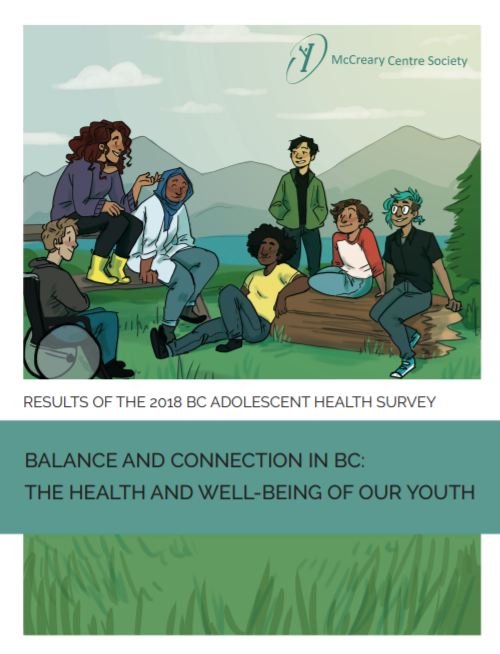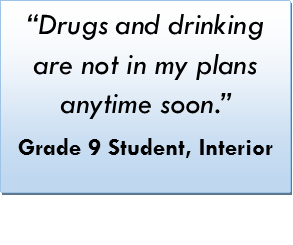|
|
|
| |
| |
|
Adolescent Health Survey 2018
|
![Adolescent Health Survey 2018]() |
|
|
|
|
|
 | April 2019
Substance Use Snapshot:
2018 BC Adolescent Health Survey Results
|
|
|
|
What do you think of the Snapshots? As this is the first year we have offered the Snapshots, we hope that you have found them a useful tool to increase your knowledge and offer a healthy perspective on substance use and mental health. As a staff member, parent or student we would love to hear your thoughts, opinions and suggestions as we plan for next year. You can access a very brief survey using the link
below. Please access the survey here
|
| |
|
|
|
|
|
 | Since 1992, The McCreary Centre Society has surveyed youth aged
12 -19 in British Columbia every five years.
In 2018, over 38,000 youth in 58 of BC's 60 School Districts completed the survey. At least one classroom in each of SD 61's middle and secondary schools participated in the survey.
|
|
|
|

| The survey was developed in consultation with young people, parents, and other experts in youth health and was administered by Public Health Nurses to students in mainstream public schools between February and June 2018.
Survey results have been published in the document: Balance and Connection in BC: The Health and Well-Being of Our Youth.
Results have been organized into four main categories: General Overview of Young People in BC, Health Profile of BC Youth, Risks to Healthy Development and Supporting Health Development.
There is also a summary that identifies the key findings of the survey.
Additional reports at the regional level will be published during 2019, and a range of special topic reports will be published using the data. The first will be
an in-depth look at the health of Metis youth who completed the survey.
|
| |
|
|
|
In 2018, most youth reported they had a good quality of life, and most also rated their overall health and their mental health as good or excellent. For example, 79% felt they had a good life, and 73% felt their life was going well.
However, health ratings declined from five years earlier, and there was an increase in youth reporting they had a mental health condition, and specifically anxiety disorder or panic attacks, depression, PTSD and ADHD.
15% of students reported missing classes in the past month because of mental health challenges and 14% were too anxious or depressed in the past year to participate in extracurricular activities.
|
|
|
|
|
|
|
 Alcohol: Among students who drank alcohol the Saturday before they filled out the survey, 61% engaged in binge drinking*, which was a decrease from 76% in 2013.
Females remained more likely than males to exceed the recommended number of drinks for adults.
|  Tobacco: There was an overall decrease in the percentage of youth who smoked tobacco, and those who did smoke waited longer to try it.
However, in the past month, 21% had vaped with nicotine and 19% without nicotine.
|  Marijuana: There was no increase from previous years in the percentages of youth who had tried marijuana or other substances. Youth who did use marijuana waited longer to first try it.
|
|
|
*The Adolescent Health Survey states that binge drinking refers to males who consume four or more alcoholic drinks within a couple of hours and females who consume three or more.
|
|
|
|
|
|
|
For young people in BC to thrive and become healthy and contributing adults, they need caring, supportive relationships; opportunities to grow, develop, and challenge themselves; and the resources to participate in their community. Providing these supports can also reduce a wide range of health-risk behaviours.
Youth in 2018 were more likely than their peers five years earlier to approach school staff for help.
In the past year:
55% of students had asked a teacher for help (vs. 41% in 2013)
31% asked a school counsellor (vs. 27%)
23% asked other school staff (vs. 16%)
|
|
|
|
|
|
|
|
|
Youth Action Grants: The Youth Action Council supports a funding program that is now accepting applications from youth wanting to deliver a project to improve youth health in their school or community. The Youth Action Council are also available to offer grant-writing workshops to young people who may be thinking of applying for a grant. You can access the grant
application here
|
Next Steps Workshop: An interactive "Next Steps" workshop will be available shortly to engage youth in a dialogue about the results and youth health in their community.
|
Regional Reports: In addition to special topic reports using the data (first one will focus on Metis Youth), regional level reports will be published throughout 2019. There will also be reseach projects involving secondary analysis of the survey data with academic institutions and other agencies, which will be submitted to peer review.
|
|
|
|
|
|
|
|
|
|
|
|
|
|
|
The Greater Victoria School District is committed to providing safe and healthy learning environments for all students. As part of our approach, we have been focusing on mental health and substance use topics to help us promote well-being in our schools.
Substance use is a complex topic that often highlights varied philosophies, myths, and a great deal of fear.
|
The research shows us that early interventions, particularly around critical thinking and decision making, has an impact on delaying use in youth. As well, open dialogue with adults, intentionality around attachment, and a focus on the factors that contribute to substance use, as opposed to the actual substances, also prevent, delay and reduce substance use in our students.
|
Our goal is to create a more cohesive, systematized substance use plan focusing on social emotional learning, that includes our youth and schools, community partners, and families. We strive for a shared vision, common language and consistent messaging over time, in order to support positive youth culture and a healthy perspective on substance use and mental health.
|
|
|
|
The legal age in B.C for consumption of alcohol and cannabis is 19 years old.
|
| |
|
|
|
| |
|
|
|
|
|
|
|
|
| |
|